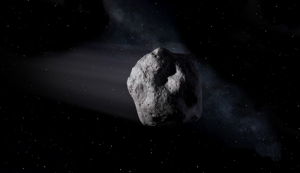To err is human, and that saying doesn’t magically become moot just because the stakes are high.
That was the message political and legal experts offered to scientists gathered at the International Academy of Astronautics’ Planetary Defense Conference, held in College Park, Maryland, last week. The conference was dedicated to discussing planetary defense — the art of spotting and, if necessary, diverting asteroids that seem to be on track to hit Earth — from a range of perspectives, bringing together asteroid scientists, spacecraft engineers, disaster managers and, yes, political and legal experts.
Scientists and engineers know in theory what they could do if an asteroid threatens serious damage to any patch of Earth, depending on how much warning they have. They can send one or more large spacecraft up to block the asteroid’s path and slow it enough that it misses its date with Earth. Or they can detonate a nuclear weapon near the asteroid’s surface, vaporizing some of the rock and sending the remainder of the body in the opposite direction.
And assuming that they can get good-enough observations of the asteroid, they can do all the math to figure out when to knock it, with how much force, carried on which rockets, launching on what date. What could go wrong? A lot, it turns out!
Read more HERE
Ask me anything
Explore related questions





